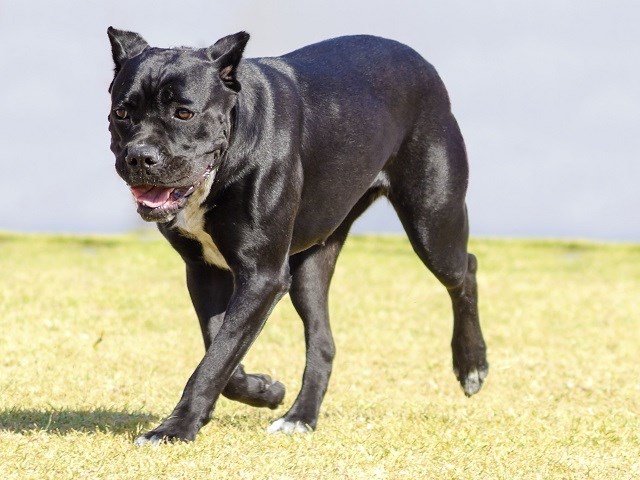Cane Corso Breed Information
At a Glance
| Male Height | 24 - 28 inches |
| Female Height | 23 - 26 inches |
| Male Weight | 100 - 110 pounds |
| Female Weight | 90 - 100 pounds |
| Size | Large |
| Colors | black or fawn |
| Hypoallergenic | No |
| Personality | Affectionate, Alert, Brave, Confident, Gentle, Loyal, |
| Lifespan | 10 - 12 years |
Introduction
The Cane Corso, also known as the Italian Mastiff is a large Molosser, closely related to the Neapolitan Mastiff. It is well muscled, but less bulky than most other Mastiff breeds. For a while this breed was rare (even in Italy) where it could only be found in a small area. However this breed was revived by enthusiasts, and after reestablishing itself in Italy has steadily become popular in the United Sates over the last 20 years.
History
The ancestors of the Cane Corso were originally used by the Romans in warfare, and boar hunting. Later owners found their use as guard dogs to protect to protect their homes and farm animals. It is commonly used as a night watch dog.
Temperament
The average Cane Corso owner tends to describe this breed as been intelligent and loyal - always wanting to please. They are docile and affectionate with the owner can are very wary of strangers. The dog is known to be tenacious - and is not one to back down to another dog. When a Corso is alerted to danger, it quickly transforms from a docile pet into a protective and potentially dangerous animal willing to protect its owner with its life.
Coat
The coat is smooth and short and usually one of two colors - blank or fawn - sometimes it will show some brindle.
Do Italian Mastiffs do well in Apartments?
These dogs are not particularly suitable to apartments. Although they are not as high energy as some other breeds their size they do like some space.
Barking
For the most part Corsos are fairly docile creatures, and are not real barkers unless the sense danger - for this reason they make good watch and guard dogs.
Do Italian Mastiffs Get Along With Children & Other Pets?
Corsos are always gentle with family members and people they know well. However they have a high prey drive and can chase and kill other small animals - so they do not make a good pet for someone who keeps other small pets such as cats and rabbits or even smaller dogs.
Exercising a Cane Corso
The Cane Corso is a dog that likes to be active - a true working dog. However they are not high energy breeds, so and hour or two of walks a day is usually fine for them. A medium sized back yard gives them an area to patrol and alleviates their boredom when there is nothing else for them to do.
How to Groom a Cane Corso
The Cane Corso has a smooth coat that sheds. Brush once or twice a week to remove dead hair and keep the skin and coat healthy, and clean the ears and trim the nails on a regular basis. Bathing should be kept to a minimal, and only a mild shampoo should be used.
Italian Mastiff and Shedding
They have short coats that shed throughout the year, but their hair loss is fairly low. Hair loss may be heavier in the Spring and Fall months when they adjust their coats for the Summer and Winter seasons
Italian Mastiff Health Problems?
Cane Corsos suffer from many of the same hereditary problems as other Mastiff breeds. These include hip and elbow dysplasia, eye problems and bloat, but in general they are fairly healthy dogs.
Are Italian Mastiffs Intelligent?
The Corso is a dog of average intelligence which means it should be able to understand verbal commands after 25 to 40 repetitions, and obey a first command about 50% of the time.
Cane Corso
As with most of the Mastiff type breeds training should begin early. Socialization is the first step, especially if you expect the dog to spend time around children and other animals. The trainer must be firm and confident with the dog - so that he knows precisely what the owner expects of him. Consistency is the key to bringing up a dog that is both amenable, and that can reconise and respond to real threat.
